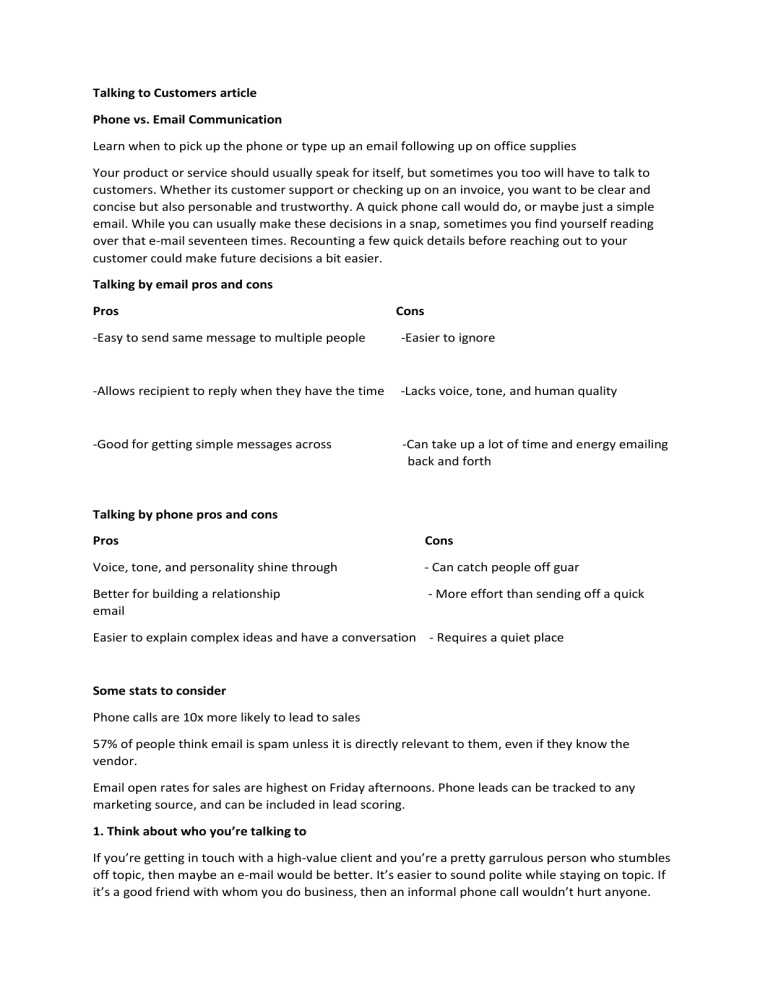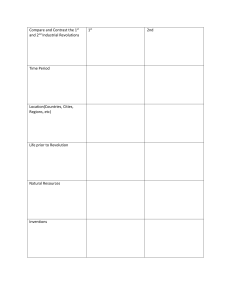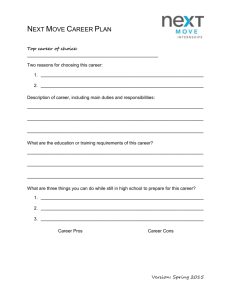
Talking to Customers article Phone vs. Email Communication Learn when to pick up the phone or type up an email following up on office supplies Your product or service should usually speak for itself, but sometimes you too will have to talk to customers. Whether its customer support or checking up on an invoice, you want to be clear and concise but also personable and trustworthy. A quick phone call would do, or maybe just a simple email. While you can usually make these decisions in a snap, sometimes you find yourself reading over that e-mail seventeen times. Recounting a few quick details before reaching out to your customer could make future decisions a bit easier. Talking by email pros and cons Pros Cons -Easy to send same message to multiple people -Easier to ignore -Allows recipient to reply when they have the time -Lacks voice, tone, and human quality -Good for getting simple messages across back and forth -Can take up a lot of time and energy emailing back and forth Talking by phone pros and cons Pros Cons Voice, tone, and personality shine through - Can catch people off guar Better for building a relationship email - More effort than sending off a quick Easier to explain complex ideas and have a conversation - Requires a quiet place Some stats to consider Phone calls are 10x more likely to lead to sales 57% of people think email is spam unless it is directly relevant to them, even if they know the vendor. Email open rates for sales are highest on Friday afternoons. Phone leads can be tracked to any marketing source, and can be included in lead scoring. 1. Think about who you’re talking to If you’re getting in touch with a high-value client and you’re a pretty garrulous person who stumbles off topic, then maybe an e-mail would be better. It’s easier to sound polite while staying on topic. If it’s a good friend with whom you do business, then an informal phone call wouldn’t hurt anyone. They’re probably already used to hearing about your son’s epic middle school baseball games anyway. At this point in your life, you probably know which option makes you more nervous. Since everyone appreciates a straight forward answer with some sophistication, go with the option that makes you feel calm, cool, and collected. 2. Try telling yourself what it is you actually want to say Don’t just think it through but actually try and pick out the specific things you want to address. Some people find that communicating in writing is much more difficult than over the phone, since you can’t add immediate clarification. If you start writing and find yourself going in circles, clear your head and try again. Don’t just grab the phone, because chances are you’ll just end up saying the same thing, and then it’ll just be more awkward for the two of you once you both realize that you have no idea what you’re talking about. If you really find that what you have to say is just too complicated to explain in writing, then make sure you at least jot down some notes before calling. 3. Consider whether you need a response If you need a quick answer, the phone is your best friend. If you don’t mind what you have to say potentially lounging for a day or two, then an e-mail is fine too. In reality though, people probably ignore requests over the phone just as often as with e-mail. Guaranteeing that what you ask for actually gets done (or that someone will write you back) is less a function of what medium you use and more about how you say it. Being clear and open to questions makes people feel much more comfortable, which means they’ll more likely follow through. In general, e-mail is a better choice when you want to keep a digital record of your communication, keep track of sticky details, follow up, or give a quick status update. You don’t, on the other hand, want to be sending sensitive details in an e-mail. In that case, a phone call is better. You should also generally call someone if you know that your Inbox or your customers are overloaded already, you’re worried about miscommunication because of tone, or you’re introducing yourself and want to leave a good impression. 4. Can you text instead? You can’t go wrong with phone or e-mail, but what about texting? It might be more acceptable than you think. Bank of America is starting a pilot program next year that will notify you via text when you try to make a purchase with your debit card that will overdraw your account. You can reply directly to either prohibit the individual transaction or allow your purchase and accept the overdraft fee, which can be refunded if you replenish your account before 8pm that day.



